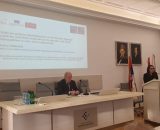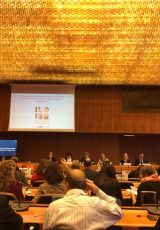
Sudjelovanje na tribini “Rad po mjeri žene: Kako do pravednijeg položaja žena na tržištu rada”
Ženska sekcija Saveza samostalnih sindikata Hrvatske organizirala je javnu tribinu Rad po mjeri žene: Kako do pravednijeg položaja žena na tržištu rada.
U okviru tribine raspravljani su i rezultati InCARE projekta, ukazujući na izazove s kojima se nose roditelji u netipičnoj i nestabilnoj zaposlenosti. Snimka tribine dostupna je na linku: https://www.youtube.com/watch?v=eSRseO8Y5lE
Presentation of the InCARE project results at the University of Belgrade, Institute for Philosophy and Social Theory
The final results of the InCARE project are going to be presented on February 24th 2021 in Belgrade. The lecture “Childcare-related policies, gender and social inequalities: Serbia in a comparative perspective” can be attended following this link: https://ifdt.bg.ac.rs/en/event/ivana-dobrotic-childcare-related-policies-gender-and-social-inequalities-serbia-in-a-comparative-perspective/
Video is available here.

Radionica “Politike skrbi za djecu u regiji: problemi i rješenja”
U okviru InCARE projekta 4.12.2020. održati će se radionica za udruge koje rade s roditeljima ili se bave zagovaranjem roditeljskih prava. Puni program može se pronaći ovdje.
Na radionici će biti predstavljani rezultati istraživanja s roditeljima djece predškolske dobi provedenog u okviru InCARE projekta. Istraživanje daje uvid u izazove s kojima se susreću roditelji s nesigurnim položajem na tržištu rada u nedostatku adekvatnog pristupa roditeljskim dopustima i dječjim vrtićima. Na radionici ćemo raditi na vještinama analize policy problema, pretvaranja analize u preporuke i komunicaranja preporuka u vidu policy sažetka (memo/brief). Ideja je da se rasprave rezultati istraživanja, a ponajviše ono što vi nosite iz vlastitog rada na terenu te zajednički izrade smjernice/preporuke koje bi poslužile kao materijal za buduće zagovaračke aktivnosti u Hrvatskoj i regiji.
Pozivamo sve zainteresirane udruge da se odazovu radionici. Registrirati se možete slanjem elektroničke poruke na: ivana.dobrotic{at}spi.ox.ac.uk

Webinar “Reimagining care policies in South-Eastern Europe and beyond”
The webinar will be held on November 25th 2020. Please find the full program here.
For the link to the event, please email: ivana.dobrotic{at}spi.ox.ac.uk

New study unpacks variations in childcare services and primary schools closures and re-openings in 28 European countries
From mid-March 2020, childcare services and schools were closed in many countries around the globe in the fight of the COVID-19 pandemic. New research published in European Societies explores early childhood education and care services, and primary schools closures and re-openings in 28 European countries. It shows that there were striking cross-country differences in pandemic ‘childcare-policy responses’. They varied particularly in the re-opening phase – both in being more lenient or strict, and in being universal or selective. The research provides a conceptual framework that allows to unpack and classify these variations, arguing that the differences in responses result from a country-specific combination of pandemic prevention strategy (focused either on high-risk groups or the whole population) and childcare-related policy concerns (for example, educational goals or work-family reconciliation). It provides a basis for future research into the cross-country variation of responses, as well as gender and social consequences of the COVID-19 pandemic.
Article: Blum, S. & Dobrotić, I. (2020), Childcare-policy responses in the COVID-19 pandemic: unpacking cross-country variation, European Societies, https://doi.org/10.1080/14616696.2020.1831572
News: New study explores variation in COVID-19 school and childcare policies across Europe

Invited lecture at European Graduate School for the Social Sciences PhD School (EUSOC) at Masaryk University
On October 2nd 2020 InCARE project results were presented at European Graduate School for the Social Sciences PhD School (EUSOC), organised by the Masaryk University. Lecture “Childcare policies and their variations in former socialist countries” pointed at growing cross-country and within-country inequalities in parents’ abilities to engage in employment and care, related to childcare policy developments in former socialist countries.

How did European countries approach the closure and re-opening of ECEC and primary schools in the COVID19 pandemic?
The coronavirus pandemic had shifted the research focus to various aspects of the pandemic, including its social and gender implications. The InCARE project contributed to these efforts with its involvement in the study on pandemic ‘childcare-policy responses’. Data on primary schools closures and re-openings in 28 European countries were collected, showing striking cross-country differences in pandemic ‘childcare-policy responses’. First findings were presented at EGPA Online Session, PSG XX Welfare State Governance and Professionalism & PSG XXI Policy Design and Evaluation on 3 September 2020, and at International Network for Leave Policies & Research Webinar „Parental Leave under COVID-19: global perspectives” on 17 September 2020.
Presentation is available here.
Recording is available here.

The article and dataset on childcare policy development in Bosnia and Herzegovina (1945-1990)
The article explores the shifts in (women’s) social citizenship in Bosnia-Herzegovina and its effect on the development of childcare policy in the 1945–2019 period. Gendered, selective childcare policy, which was inherent in the socialist notion of social citizenship and aimed to emancipate women as ‘worker-mothers’, deteriorated in the transition period when ethnicity became prioritized over gender and class. Exclusionary citizenship practices increased with the post-1990 reforms as gender and social inequalities incorporated into childcare policy design become intertwined with inequalities based on ethnicity and/or locality. The post-1990 period is characterized by discontinuity, retrenchment and weak implementation of childcare-related rights.
Article: Dobrotić, I., Obradović, N. (2020), The exclusionary side of (women’s) social citizenship in Southeastern Europe: childcare policy development in Bosnia-Herzegovina and gender, social and territorial inequalities, Southeast European and Black Sea Studies, 20(3) 411-430. DOI: 10.1080/14683857.2020.1805890
Dataset: Dobrotić, I., N. Obradović. (2020), InCARE – BIH’s leave policy database 1945-2019.

New article on parenting-related leaves in 21 former socialist countries
This article explores the patterns and dynamics of parenting-related leave policy reforms in the European former socialist countries (EFSCs). It sheds light on the development pattern of their leave policies and their potential to reproduce, impede, or transform traditional gender norms in employment and care. The article provides a historical comparative analysis of leave policy developments in 21 EFSCs in the 1970–2018 period. It systematically explores continuity and changes in leave policy design − generosity (leave duration and benefits level) and fathers’ entitlements to leaves − as well as policy concerns and gender-equality-related implications.
Article: Dobrotić, I. & Stropnik, N. (2020), Gender equality and parenting-related leaves in 21 former socialist countries, International Journal of Sociology & Social Policy, Vol. 40 No. 5/6, pp. 495-514.
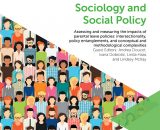
Guest editorial in International Journal of Sociology and Social Policy
This special issue focuses on the designs, implementations and impacts of parental leave policies and the conceptual and methodological complexities involved in assessing, measuring and theorizing those designs. Each article in this special issue expands the contemporary debate on parental leave and gendered power and inequalities by engaging with intersectional analyses and exploring the methodological complexities of assessing and measuring progressive social change. The issue also aims to reimagine work/care policies that could lead to more equitable and just social worlds. The interdisciplinary contributions in this special issue are based on papers that were presented at the 15th Annual Seminar of the International Network on Leave Policies and Research (LP&R), held in Toronto, Canada, in July 2018.
Special issue: Doucet, A., Dobrotić, I., Haas, L. and McKay, L. (2020), Guest editorial: Assessing and measuring the impacts of parental leave policies: intersectionality, policy entanglements, and conceptual and methodological complexities, International Journal of Sociology and Social Policy, Vol. 40 No. 5/6, pp. 425-427. https://doi.org/10.1108/IJSSP-01-2020-0016

COVID-19 and gender and social implications of ‘care crisis’ in Croatia
Blog on a lack of Croatian government’s response to ‘care crisis’ caused by the COVID-19 pandemic related childcare and school closure can be found here (in Croatian). The blog was also translated to German and published at FES blog “Corona & Care” and Blickpunkt Kroatien br. 3/2020.
The blog addresses the first two COVID-19 recovery plans in Croatia and points out that they were focused only on economic aspects of the pandemic, ignoring a social dimension of the crisis. Namely, although the unequal gender and social effects of the childcare and school closure were easily predictable, the Croatian government’s response failed to acknowledge the specific challenges parents were faced with (especially families and children at risk of poverty). The only concrete proposals aimed at parents came from opposition parties. However, the proposal of a group of representatives of the left and right political spectrum demanded the extension of maternity leave and the abolition of father’s quotas. Such a proposal runs against the EU work-life balance directive and would have a negative effect on the position of women in the long run. Although on a better track, the social-democrats’ proposal to introduce a temporary wage compensation for a parent with a child under twelve years of age not able to work targeted only parents in stable employment. These proposals were not voted for, while there is also no response to the challenges faced by parents in precarious and non-standard forms of employment and parents (and children) at risk of poverty.
The blog concludes that in order to prevent a ‘social crisis’ with longer-term consequences, it is more than necessary to introduce measures aimed to address the social implications of the pandemic. Measures aimed at specific needs of parents and families are needed, such as additional financial assistance to families with children and a degendered ‘crisis leave’ that will also cover parents in precarious and non-standard forms of employment. The opening of schools and kindergartens should be accompanied by a more elaborated model than currently offered, while employers themselves should also provide a number of measures that will make the new situation easier for parents.
International Women’s Day 2020
On March 6th 2020, I took part in the event ‘Strong Women – Strong European Union‘ organised by the Croatian Presidency of the Council of the EU to mark the International Women’s Day 2020. The EU Commissioner for Equality, Helena Dalli presented the key priorities of the ‘Gender Equality Strategy: Striving for a Union of equality’, released just a day before this event that are briefly presented here.
The main part of the event was the panel I had a pleasure to facilitate, discussing both the EU achievements and future challenges in the field of gender equality together with Paul Reiderman, Director for Employment, Social Policy and Health, General Secretariat of the Council of the EU; Carlien Scheele, Director, European Institute for Gender Equality; Dubravka Šimonović, UN Special Rapporteur on Violence against Women and Markus Warasin, Head of Unit of the parliamentary Committee on Women’s Rights and Gender Equality, European Parliament. Throughout the panel, the need for the EU to strengthen its action in the field of gender equality and other intersecting inequalities was emphasised, particularly a need to work more on the implementation of its priorities. Overall, special attention was given to work-family policies and a need to accommodate social security systems in Europe to better respond to changing labour market conditions and employment types, lifestyles and family types, as well as to the topic of violence against women and women’s under-representation in political and public decision making.
Keynote at 5th Conference of the LSEE Research Network on Social Cohesion in South-East Europe
On 21st November 2019, the InCARE project results were presented in Belgrade at the 5th Conference of the London School of Economics and Political Science Research Network on Social Cohesion in South-East Europe (LSEE) “Economic and social inclusion in an age of political uncertainty in South-East Europe”.
Keynote “Childcare-related policies developments in the former Yugoslav countries and their implications for gender and social (in)equalities in care and employment” addressed similarities and differences in childcare policies development in the former Yugoslav countries since the 1950s. It highlighted growing gender and social (in)equalities in care and employment in South-East Europe, which are a result of both childcare policy design and growth in precarious, underinsured and nonstandard employment.
100 years of maternity protection
On November 8th, 2019, I took part in the celebration of 100 years of maternity protection in Geneva organised by International Labour Organisation (ILO), European Commission and International Network on Leave Policies & Research. The conference “A Century of maternity protection: Transforming leave and care policies for a better future of work for all” provided a unique opportunity for policymakers and experts to discuss both achievements and (future) challenges in the area of maternity protection around the world.
It was 1919 when ILO adopted the first international standard on maternity protection, the Maternity Protection Convention 1919/No.3, which recognised the right to paid maternity leave with employment protection. Although maternity protection has expanded since then, many (future) mothers are still left without adequate access to maternity leave or other forms of maternity protection. Maternity Protection Convention has been ratified in 55 countries (see Figure). ILO invited all states to recognise the importance of maternity protection and ratify the Maternity Protection Convention 2000/No.183, which is seen as an essential element in achieving the Sustainable Development Goals of good health, gender equality, decent work and economic growth. See: https://youtu.be/fdxJTbteWqg
Presentation at the University of Oxford, Department of Social Policy and Intervention
On 23rd October 2019, the InCARE project results were presented at Family Research Group at the Department of Social Policy and Intervention, University of Oxford. Presented paper ‘Gender aspect of childcare-related leaves in 21 former socialist countries‘ (co-authored with Nada Stropnik) systematically explores continuity and changes in leave policy design in 21 European former socialist countries in the 1970-2018 period. It sheds light on the development pattern of leave policies and their potential to reproduce, impede or transform traditional gender norms in employment and care. Following the state-socialist commitment to gender equality, European former socialist countries early introduced childcare/parental leaves. Still, they developed mother-centred leaves of equality-impeding character and detrimental for gender equality. Leave policies of European former socialist countries that joined the EU have been gradually transformed towards more gender-equal ones.
InCARE report “Changing faces of social and gender inequalities in childcare-related policies design in the post-Yugoslav countries” in media
The policy report “Changing faces of social and gender inequalities in childcare-related policies design in the post-Yugoslav countries”, which aimed to disseminate the first InCARE project’s results, was well received in Croatian media.
On July 19th 2019, portal Libela published the blog based on the InCARE policy report. The blog addressed the issue of growing inequalities in access to childcare-related rights in the post-Yugoslav countries. Namely, the InCARE project results show that childcare policies in most of the post-Yugoslav countries (continue to) reproduce or even strengthen social and gender inequalities in parenting practices related to care and employment, with pronounced regional differences. While some of the reforms over the last three decades have improved the parents’ rights, it is difficult to deny that there has been little progress towards ensuring equal opportunities for all parents, regardless of their gender, socioeconomic status, ethnicity, residency region, family status, etc. Reforms have not been considerate enough to the multiple causes of inequalities and had a weak potential to prevent and overcome gender and social inequalities in parenting practices, as well as to promote the well-being of all children.
On July 28th 2019, I gave an interview for Jutarnji list, daily newspaper, addressing the risks related to underdeveloped early childhood education and care system in Croatia.
Presentation at the 4th Transforming Care Conference “Changing priorities: The making of care policy and practices“
On June 25th 2019 the InCARE project results were presented at 4th Transforming Care Conference “Changing priorities: The making of care policy and practices“ in Copenhagen. Paper “Inequality Dynamic of Childcare–related Policies Development in the Post-Yugoslav Countries” explored the (in)equality dynamic of childcare-related policies reforms in the post-Yugoslav countries and their implications. It shows that although the childcare-related policies (i.e. parental leaves and early childhood education and care services) in the post-Yugoslav countries are becoming more inclusive, allowing wider groups of parents to access the childcare-related rights (e.g. self-employed, parents with short-term contracts, farmers, inactive parents), the stratified effect of childcare-related policies strengthened, i.e. policy reforms intensified gender and social inequalities in work-care relations.
Report on social and gender inequalities in childcare-related policies design in the post-Yugoslav countries
Report on social and gender inequalities in childcare-related policies design in the post-Yugoslav countries is now available and can be read here.
Presentation at the Croatian Sociological Association conference
On April 12th 2019 the first InCARE project results on childcare-related policies development in the post-Yugoslav countries were presented at the Croatian Sociological Association conference “Socijalna kohezija u društvu polarizacije, konflikata i nejednakosti” in Zagreb.
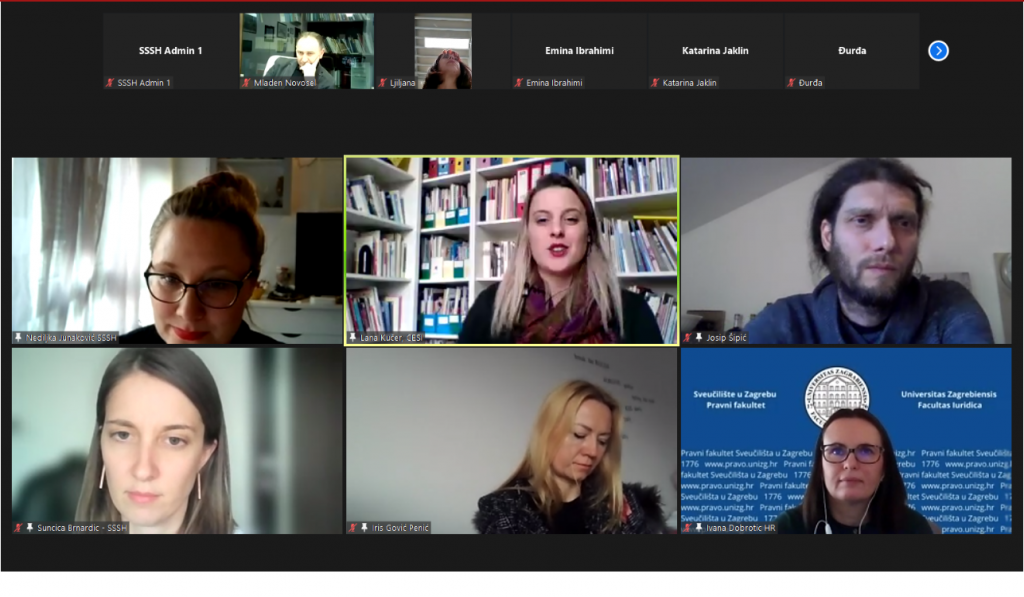
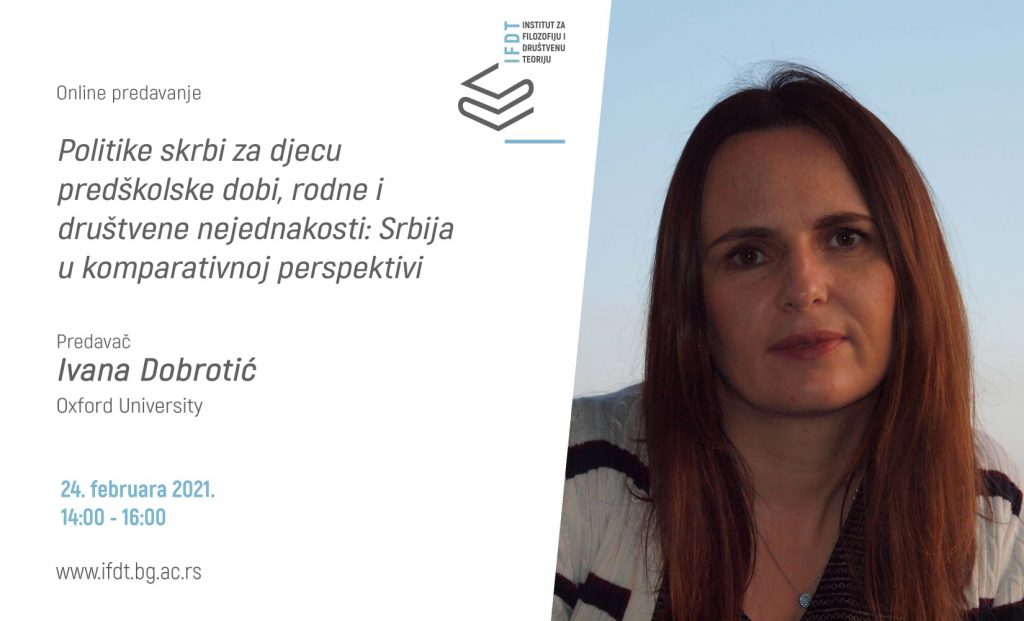
![AK9I7119[2] AK9I7119[2]](https://www.incare-pyc.eu/wp-content/uploads/elementor/thumbs/AK9I71192-scaled-ombdguecv3jo9dv02v40uq7ky55wl15ke3zxhu6tjo.jpg)
